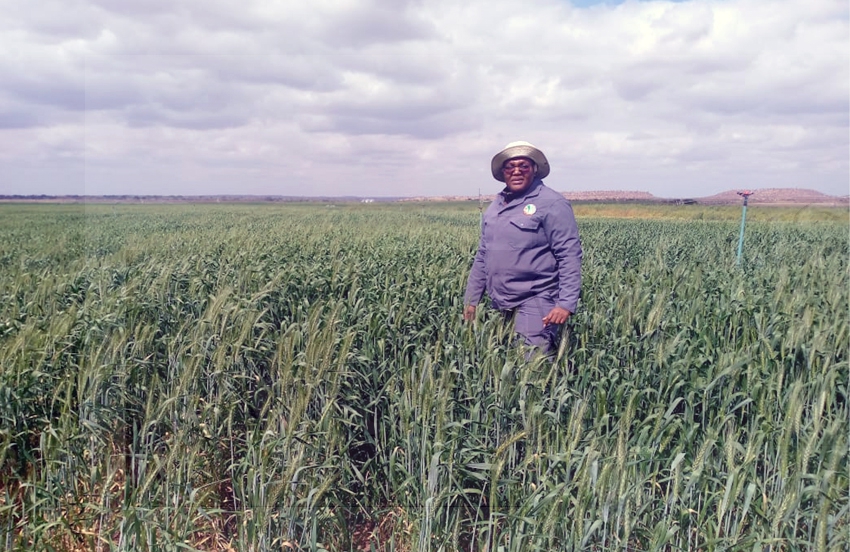Lobu trains beneficiaries on bee keeping
18 Apr 2023
It always seems impossible until it is done. Failure is not fatal, it is the courage to continue that counts. This was proven by men and women who recently braved the scorching sun enduring a long journey from Gweta to Lobu to learn about beekeeping.
“The journey was long and hard, but we have finally arrived,” says 57-year-old Cecelia Keikantsemang of Gweta flashing a smile as she alighted from a minibus which carried about 20 beneficiaries from Gweta, Nata and Tutume at Lobu Small Stock Farm recently.
Ms Keikantsemang has been keeping her ears to the ground since 2021 for such an opportunity and the moment she entered through the gates of Lobu she was overjoyed.
“I was just home doing nothing when I received a call from friends about a beekeeping training. Since I am not working, I took up the opportunity with the hope that it will help me look after my family,” she said.
She jumped at the opportunity availed by government free of charge as all transport, meals and accommodation costs were taken care of.
Another beneficiary, Ms Uyega Sepepe also from Gweta received the opportunity open handedly.
“Goromente o ntshitse mananeo gore re ithuse re nyeletse lehuma. Re ithuse re itirele dijo, gatwe re ipope re le bomme ka ditlhotshwana re tle re thusiwe, mme jaanong bangwe ba rona re ntse fela mme re bolawa ke tlala. Ka ipotsa gore a mme re itirela sentle?”
She took it upon herself to move from office-to-office enquiring about bee keeping until she found the relevant office.
True to the saying that I am because you are, she moved about from household to household in her village rounding up other women to attend the course together.
“Others refused to join while others embraced the idea, and here we are finally. We have made it! ”she said, beaming with joy.
Department of animal production veterinary assistant Mr Gaapalelwe Tshwanang said the bee keeping training sought to instill in-depth knowledge on beneficiaries who were expected to then make use of the apiculture knowledge upon their return to their communities.
“Five beneficiaries come from Gweta, six are from Nata while six are from Tutume constituting both men and women under LIMID Training Programme. The beneficiaries were selected looking at the fact that some already have bees but do not know how to keep them for profit, some have expressed interest to keep them, so we grouped them to bring them here,” says.
The training coordinator, Department of Animal Production, Apiculture division principal technical officer, Mr Boatametse Dimeku said beekeeping trainings were conducted at Ramatlabama AI center and at Lobu Small stock Farm adding that so far in a period of six months they have offered seven training courses nationwide.
“We in the business of honey production, are now training lead farmers who can be able to train others in communities, assist people to harvest honey and offer knowledge offhand to locals. After these trainings we shall only come in to offer expert advice,” he said.
The move, he said would bring in economic opportunities for lead farmers and help beneficiaries improve their economic status through sale of honey and by-products.
More farmers who will be coming from Ngamiland, Ghanzi, Kgatleng, and southern, southeast, Kgalagadi, Kweneng, Nata and Gweta are to be trained.
He said the vegetation determined the type of honeybees they would produce depending on what they forage on.
“We always get different tastes of honeys depending on the vegetation, you can have bees from orchards producing citrus tasting kind of honey and the ones who forage on grass have a unique taste as well. Kgalagadi honey is unique in that sense as the bees forage predominantly on grass,” he said.
According to United Nations Environment Programme, bees are not only important in honey production. There are other services such as hiring a colony of bees for pollination.
Furthermore, a farmer can keep bees for migratory purposes whereby one moves them to other areas where there is forage.
Furthermore, the UN states that beekeeping also provides an important source of income for many rural livelihoods.
Currently, the western honeybee is the most widespread managed pollinator globally, and more than 80 million hives produce an estimated 1.6 million tons of honey annually.
Pollinators contribute directly to food security. According to bee experts at Food and Agriculture Organization, a third of the world’s food production depends on bees.
When animals and insects pick up the pollen of flowers and spread it, they allow plants, including many food crops, to reproduce. Birds, rodents, monkeys and even people pollinate, but the most common pollinators are insects, among them, bees.
Nonetheless it states that bee populations have been declining globally over recent decades due to habitat loss, intensive farming practices, changes in weather patterns and the excessive use of agrochemicals such as pesticides. This in turn poses a threat to a variety of plants critical to human well-being and livelihoods. ENDS
Source : BOPA
Author : Calviniah Kgautlhe
Location : LOBU
Event : Interview
Date : 18 Apr 2023



